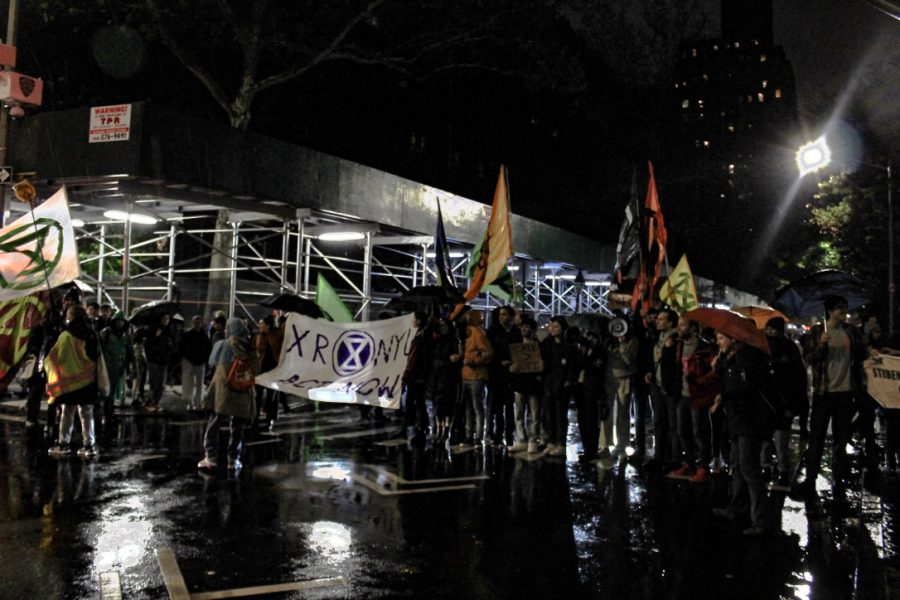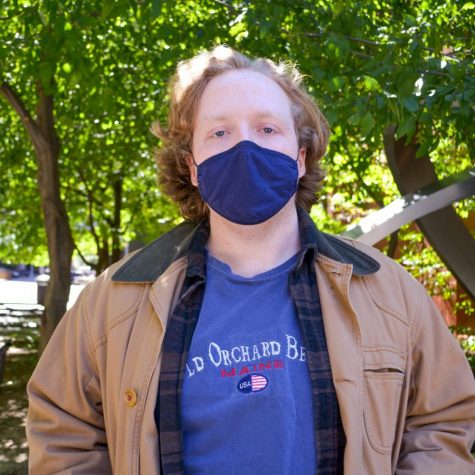Instead of going out on Thursday night, hundreds of New York City college students pressed universities to take action on climate change in a march from Bryant Park to Washington Square Park.
Extinction Rebellion NYC, an offshoot of a climate group founded in London last year, marched with drumline and all in hopes of pushing universities to divest from fossil fuels and be carbon neutral by 2025. In the past, efforts to have NYU divest from fossil fuels have failed, with the NYU Board of Trustees vetoing a resolution for full divestment in 2016. However, a resolution passed last semester that changes NYU’s current goal of carbon neutrality by 2040 to one of complete reliance on renewable energy in the same time frame.
Beyond chants of “Hey hey, ho ho, fossil fuels have got to go” and “If we don’t get it, shut it down,” members of Extinction Rebellion utilized a series of direct action tactics in order to disrupt business as usual and force people to confront the realities of climate change.
“We have rebel rousers — people who come up with the chants and are leading the march — and then we have swarming groups, which is the people who […] go block the roadway and then you leave when the police ask you to so you don’t get arrested,” organizer and Tisch sophomore Izabel Estrin said.
One protestor was briefly handcuffed after swarming an intersection near Madison Square Park, but was later released.
“I’ve been involved in different environmental movements for 20 years and nothing has changed,” the protestor, who didn’t want to be named, said. “Extinction Rebellion is getting media attention and nonviolent direct action works.”
Extinction Rebellion is a decentralized group with no formal hierarchy, opting for a grassroots strategy focused on the three demands: to tell the truth, act now and create a citizens assembly, or a representative group of everyday people, to address the problem of climate change.
Extinction Rebellion US, acknowledging the criticism of the original group being predominately white and privileged, has a fourth demand of a just transition.
“A just transition prioritizes the most vulnerable people and indigenous sovereignty,” an XR organizer said in a speech outside of the New School. “[It] establishes reparations and remediation led by and for black people, indigenous people, people of color, poor communities, for years of environmental injustice.”
While Extinction Rebellion’s NYU chapter has only had one meeting thus far, CAS junior Lyle Shipp is hoping that it will be a space for students to engage in climate activism while also forcing the university to get serious about climate change.
While formal plans haven’t been made, XR NYU cited previous demonstrations at NYU such as sit-ins at the Kimmel Center for University Life or Bobst Library as inspirations for prospective future actions to force the president and administration to take concrete steps towards divestment and carbon neutrality.
Taking inspiration from previous youth protest movements, John Spies, a recent graduate of UMD and member of XR NYC, explained XR’s focus on disruption by comparing it to World War II.
“There was a front page article about the war effort every day,” Spies said. “This is a much bigger problem than that because this affects everyone, this is the future of humanity at stake.”
A version of this article appeared in the Monday, November 11, 2019 print edition. Email Matthew Fischetti at [email protected].
























































































































































